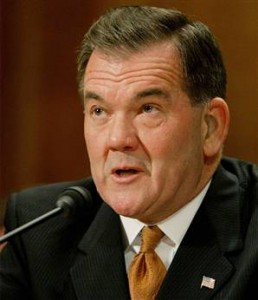THE BOSTON HERALD
U.S. leaves cooperative dissidents hanging
The just-released International Atomic Energy Agency report on the Iranian nuclear weapons program should be the final warning to the West: Iran must be dealt with now, before its advanced nuclear weapons program is operational, and while the United States still has viable options for changing the regime in Tehran. However, the news that Iran is developing nuclear weapons isn’t news at all: Western policymakers have been warned of such plans and intentions for years with exacting intelligence from the main Iranian opposition, the Mujahedin-e Khalq (PMOI/MEK).
In 2002, MEK activists risked their lives and revealed the existence of secret nuclear sites in Iran, notably the uranium enrichment site in Natanz. Since then, these activists have played a key role in the international community’s efforts to catch Tehran in its hide-and-seek escapades.
The MEK revealed in 2008 that Tehran’s scientists were working on nuclear warheads in Khojeyr, and in 2009 they unmasked the site where Tehran was working on detonators for implosion. In their latest revelation this past July, the headquarters for coordination of various aspects of nuclear weapons program that was controlled by the dreadful Revolutionary Guards was exposed.
The MEK established the existence of a secret nuclear site at Qom in 2005 — four years before it was announced by leaders of the U.S., United Kingdom and France jointly in 2009. The fact that Iran, under Mahmoud Ahmadinejad, is moving more advanced centrifuges to this underground site has compounded the concerns. And when the now defunct National Intelligence Estimate in December 2007 claimed that Iran had stopped the nuclear weaponization process, the MEK insisted its information proved the opposite. Time revealed the truth.
The warnings by the Iranian dissidents — most of whose information was at some point corroborated — resulted in precious little action in the West, which lumbered between sanctions and empty threats against the mullahs in Tehran. And instead of showing gratitude, Washington has marginalized the MEK and relegated them to an uncertain future, which may end up in their mass slaughter.
In 1997 the MEK, which at one time advocated the forceable overthrow of the regime in Tehran, was placed on the State Department’s Foreign Terrorist Organization (FTO) list as a “goodwill gesture” to open dialogue with the mullahs. Yet the MEK, which had subsequently disarmed and renounced violence against Iran, kept providing first-hand intelligence on Iran’s inner workings, particularly in the nuclear area. The U.S. Court of Appeals for the District of Columbia Circuit in July 2010 strongly challenged the designation and ordered the State Department to review it.
Dozens of senior former American officials from the past three administrations have urged Secretary of State Hillary Clinton to revoke the MEK’s designation. In their call, they have joined more than 100 members of Congress and more than 4,000 parliamentarians around the world. Yet the State Department is still procrastinating.
The unjust designation of MEK as a foreign terrorist organization has set the stage for humanitarian crisis. It has provided an excuse for Iraq — at the behest of the Iranian regime — to oppress, and even massacre, those among the 3,400 Iranian dissidents residing at Camp Ashraf in Iraq who are “protected persons” under the Fourth Geneva Convention.
After two armed assaults by the Iraqi Army on the camp in 2009 and last April — when 36 people were killed and 300 injured — the Iraq government led by Prime Minister Nouri al-Maliki set Dec. 31 as the deadline for the camp to close. His only excuse for murdering Iranian dissidents is the blacklisting by the U.S.
Last month, when the Iranian regime was caught plotting to assassinate the Saudi ambassador in Washington, President Barack Obama vowed to impose the “toughest sanctions.” Now, the prospect of Tehran’s terror masters being equipped with the most dangerous weapons looms as close as ever.
Given the current state of affairs, sanctions alone would not suffice. The U.S. should adopt a contingency plan, applicable immediately that would include the following steps:
- Removing the shackles from the Iranian opposition by removing the terror tag.
- Extending the deadline on the residents in Ashraf and preventing any Iraqi action on them.
- Imposing sanctions on the Iranian central bank.
- Organizing a campaign by our European allies to embargo Iranian oil to choke off the lifeline of the Revolutionary Guard.
Three years ago, then President-elect Obama said, “Iran’s development of a nuclear weapon I believe is unacceptable. We have to mount an international effort to prevent that from happening.” The time for action is now, Mr. President.
Tom Ridge is the former U.S. secretary of homeland security.

